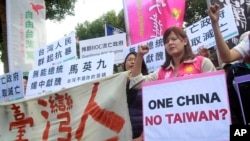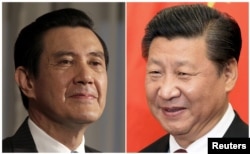ປະທານາທິບໍດີຂອງ ໄຕ້ຫວັນ ທ່ານ Ma Ying Jeou ກ່າວວ່າ ທ່ານຈະໃຊ້ກອງປະຊຸມທີ່ເປັນປະຫວັດສາດໃນວັນເສົາມື້ນີ້ ກັບປະທານປະເທດຂອງ ຈີນ ທ່ານ Xi Jinping
ເພື່ອກົດດັນ ປັກກິ່ງ ໃຫ້ຜ່ອນຄາຍກົດລະບຽບກ່ຽວກັບສາຍພົວ
ພັນທາງການທູດຂອງ ໄຕ້ຫວັນ ກັບປະເທດອື່ນໆ.
ຜູ້ນຳທັງສອງທ່ານແມ່ນກຳລັງປະຊຸມກັນໃນປະເທດ ສິງກະໂປ ສຳການເຈລະຈາຄັ້ງທຳອິດລະຫວ່າງຜູ້ນຳ ຈີນ ກັບ ໄຕ້ຫວັນ ນັບຕັ້ງແຕ່ງເກາະດັ່ງກ່າວໄດ້ແຍກອອກຈາກ ແຜ່ນດິນໃຫຍ່ໃນ
ປີ 1949 ໃນລະຫວ່າງສົງຄາມກາງເມືອງ ຈີນ.
ການປະຊຸມແມ່ນຫາກໍໄດ້ປະກາດອອກໃນວັນພຸດວານນີ້, ເຖິງແມ່ນວ່າທ່ານ Ma ໄດ້
ກ່າວຕໍ່ບັນດານັກຂ່າວວ່າຕົນໄດ້ດຳເນີນວຽກງານດັ່ງກ່າວມາເປັນເວລາຫຼາຍເດີອນກໍ
ຕາມ.ທ່ານໄດ້ກ່າວໃນວັນພະຫັດມື້ໜີ້ວ່າທ່ານຫວັງວ່າການປະຊຸມນີ້ຈະຕັ້ງບັນທັດຖານ
ໄວ້ສຳລັບການເຈລະຈາໃນອະນາຄົດ ລະຫວ່າງ ປັກກິ່ງ ກັບ ໄຕ້ຫວັນ, ໃນສິ່ງທີ່ທ່ານ
ອ້າງເຖິງການເຮັດໃຫ້ເປັນມາດຕະຖານຂອງສາຍພົວພັນ.
ທ່ານ Ma ໄດ້ກ່າວວ່າທ່ານມີແຜນທີ່ຈະໃຊ້ກອງປະຊຸມນີ້ເພື່ອຍົກບັນຫາຄວາມຫຍຸ້ງຍາກໃນການ
ເຂົ້າຮ່ວມງານສາກົນຂອງ ໄຕ້ຫວັນ ເພາະວ່າ ຈີນປ້ອງກັນປະເທດອື່ນໆຈາກການສ້າງ
ສາຍພົວພັນທາງການທູດກັບ ໄຕ້ຫວັນ. ປັກກິ່ງບໍ່ອະນຸຍາດໃຫ້ເຂດແດນດັ່ງກ່າວເຂົ້າຮ່ວມ
ໃນບາງງານທີ່ຈັດຂຶ້ນໂດຍສາກົນເຊັ່ນວ່າ ກິລາ ໂອລິມປິກ ພາຍໃຕ້ຊື່ຂອງ “ຈີນໄຕ້ຫວັນ.”
ທ່ານ Ma ໄດ້ກ່າວວ່າ ທ່ານຫວັງວ່າຈະຜັກດັນໃຫ້ ໄຕ້ຫວັນ ມີ “ເນື້ອທີ່ທາງສາກົນທີ່ຂະ
ຫຍາຍກວ້າງອອກ.”
ທ່ານກ່າວວ່າ ທ່ານບໍ່ໄດ້ມີແຜນທີ່ຈະນຳເອົາ ການອ້າງເອົາເຂດແດນຂອງ ຈີນ ໃນທະເລ ຈີນໃຕ້, ເຊິ່ງປະທະກັນກັບການແຂ່ງຂັນອ້າງເອົາໂດຍໄຕ້ຫວັນ ແລະ 4 ປະເທດອື່ນໆອີກ.
ປະທານາທິບໍດີ ໄຕ້ຫວັນ ກໍຍັງໄດ້ກ່າວວ່າກອງປະຊຸມທີ່ໃກ້ຈະມາເຖິງນີ້ບໍໄດ້ມີຈຸດປະສົງ
ທີ່ຈະຂະຫຍາຍຜົນປະໂຫຍດໃຫ້ແກ່ພັກການເມືອງຂອງທ່ານໃນຂະນະທີ່ການເລືອກຕັ້ງ
ໃນເດືອນມັງກອນ ກຳລັງຫຍັບໃກ້ເຂົ້າມາ. ພັກຊາດນິຍົມຂອງທ່ານ Ma ແມ່ນຄາດວ່າ
ຈະເສຍທີ່ນັ່ງໃນສະພາໃຫ້ກັບພັກສະໜັບສະໜູນນັກປະຕິຮູບ ຄວາມເອກະລາດ ປະຊາທິໄປໄຕ.
ໃນເມື່ອຄວາມສຳເລັດຈາກການເຈລະຈາອາດຊ່ວຍພັກການເມືອງຂອງທ່ານມີໂອກາດ
ຫຼາຍຂຶ້ນ, ພັກຊາດນິຍົມ ກໍຍັງອາດຈະຖືກເຫັນວ່າສະໜັບສະໜູນລັດຖະບານ
ແຜ່ນດິນໃຫຍ່ຢູ່.
The leaders of Taiwan and China began historic face-to-face talks in Singapore Saturday. It is the first such meeting between the two leaders in more than 60 years.
Scores of reporters crowded into the ballroom of Singapore's Shangri-la Hotel where the two shook hands and smiled. According to China's state broadcaster, the handshake lasted for one minute and 10 seconds.
In brief remarks to reporters before beginning their closed door meeting, China's President Xi Jinping said that over the past 66 years relations across the Taiwan Strait has shown that "regardless of what difficulties the two sides face, and however long they have been separated, no power can keep us apart."
Taiwan and China split amid a civil war in 1949. Since that time, communist-ruled China has remained a one-party state, while Taiwan has developed into a vibrant democracy. China claims that Taiwan is part of its own territory and wants the two sides to reunify, but support for unification in Taiwan is very low.
President Ma Ying-jeou highlighted the need to continue to deepen dialogue and ties, noting what he called the successes of his term in office. "We follow different political systems, and it has taken time to transition from military confrontation to cooperation and dialogue," Ma said.
Ma's remarks included five suggestions for the peaceful development of relations between the two sides, including the need to establish hotlines and the establishment of institutions to create what he called win-win cooperation.
The decision by Taiwan's president to meet with his counterpart in China and release news of the meeting just days beforehand has triggered protests. Some have voiced concern that the meeting is being held behind closed doors, while others have questioned the motivations of both Ma and Xi for agreeing to meet up just weeks before Taiwan holds what could be its own historic election.
Ma's Nationalist Party is trailing in the polls and for the first time could lose both the presidency and legislature. The elections are scheduled for January 16.
Ma has denied that the meeting has any connection to the elections and has said that he will not sign any agreements during the closed-door meeting.
China has been playing up the meeting heavily in its state press, but during the brief remarks by the two leaders, state-run broadcaster CCTV cut away during its live broadcast when President Ma delivered his remarks.
Criticism of China's approach to territorial disputes has peaked in recent weeks, particularly over its building of artificial islands in the South China Sea. Some analysts argue that President Xi who has previously rejected initiations to meet with President Ma - agreed to host the meeting in a bid to deflect criticism of his policies in the region.
Singapore was the same place that representatives from Taiwan and China first met in 1992. It is also a stop along a regional tour that President Xi is making to the region.
Prior to visiting Singapore, President Xi also paid a visit to Vietnam, which saw deadly protests last year and an outpouring of anti-Chinese sentiment when Beijing parked a oil rig off of Vietnam's coast.





